Nature's Power Unleashed: Debunking Myths About Cleaning with Natural Products
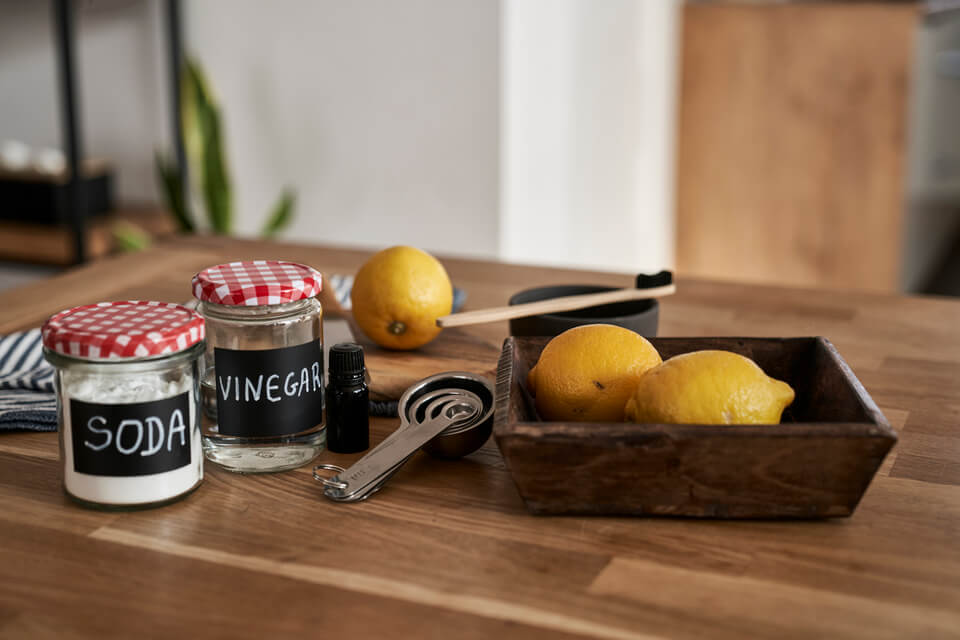
Table Of Contents
Green. It’s not just a color. These days, it’s a lifestyle description too. Many of us make conscious choices to preserve and protect the planet’s natural resources.This includes reducing the amount of trash we produce, recycling whenever possible, and choosing products that have minimal impact on the environment. As in green cleaning products, which are often at the center of the natural cleaners vs chemical cleaners debate.
At Three Little Birds, we’re passionate about using natural cleaning products. These solutions are made from substances that are less harmful to the environment compared to traditional cleaning agents, which often contain harsh chemicals. Natural cleaning products are typically made from ingredients that are biodegradable and sourced from renewable resources. They help in reducing water and air pollution, are safer for humans and animals, and reduce the exposure to toxic chemicals in the home. However, with this interest in ‘green’ cleaning comes a series of myths and misconceptions about the effectiveness of natural cleaners. In this blog, we’re going to explain and debunk these myths, which include:
- Natural cleaners are not as effective as their chemical counterparts. This idea stems from the assumption that for something to clean effectively, it must contain harsh chemicals. The truth is what many natural ingredients are, in fact, quite effective at cleaning and disinfecting.
- All natural cleaners are inherently safe and non-toxic. While it’s true that many natural products are safer than chemical ones, it’s importadoesn’t automatically mean ‘harmless.’ Some natural substances can be allergenic or irritating under certain conditions. It’s crucial to know which natural products are safe and how to use them correctly.
- Choosing natural alternatives is a luxury, out of reach for the average budget. We’ll look at the actual costs of natural cleaners compared to conventional products and discuss ways to make natural cleaning more affordable, such as homemade solutions and buying in bulk.
- Natural cleaners don’t kill germs and bacteria. In a world that’s increasingly conscious of hygiene and sanitization, it’s important to understand how effective natural cleaning products are in eliminating harmful microbes.
- Natural cleaners are only good for light cleaning. The effectiveness of natural cleaners gets questioned a LOT. There’s a perception that natural cleaners are only good for light cleaning and can’t handle tough jobs. Not true!
Whether you’re already a fan of natural cleaning solutions or skeptical about how well they work, this blog aims to help you make informed decisions about the cleaning products you use in your home.
Myth 1: Natural Cleaners Are Not as Effective as Chemical Cleaners
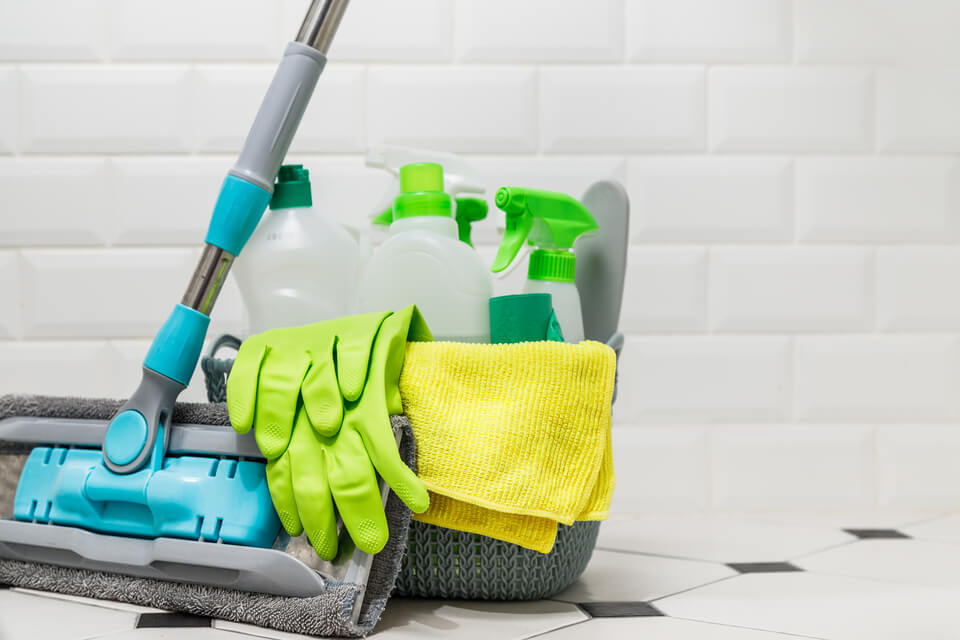
One of the most persistent myths about natural cleaning products is that they are less effective than chemical cleaners. This widespread belief stems from the assumption that strong chemicals are necessary to achieve a deep clean. However, scientific evidence and practical experience reveal that natural cleaners can be just as effective, if not more so, in many situations.
Understanding the Myth
Historically, natural cleaners have been regarded as ineffective because of traditional views on cleaning. For decades, the effectiveness of a cleaner was judged by its ability to produce immediate, visible results, which were often facilitated by harsh chemicals. Advertising played a major role in reinforcing this belief, showcasing chemical cleaners that promise to eradicate germs and dirt instantly. In contrast, natural cleaners, which often work more subtly and require different application methods, were seen as less potent.
Scientific Comparison: Natural Cleaners vs. Chemical Cleaners
Chemical cleaners often contain ingredients like bleach, ammonia, and chlorine, all of which are known for their strong disinfectant properties. These substances can effectively kill bacteria and viruses on surfaces but at a cost- they can also be harmful to human health, causing respiratory problems and skin irritation, and are detrimental to the environment. Natural cleaners, on the other hand, use ingredients derived from plants and minerals, which are biodegradable and less harmful to humans and the environment.
Specific Natural Ingredients Known for Their Cleaning Power
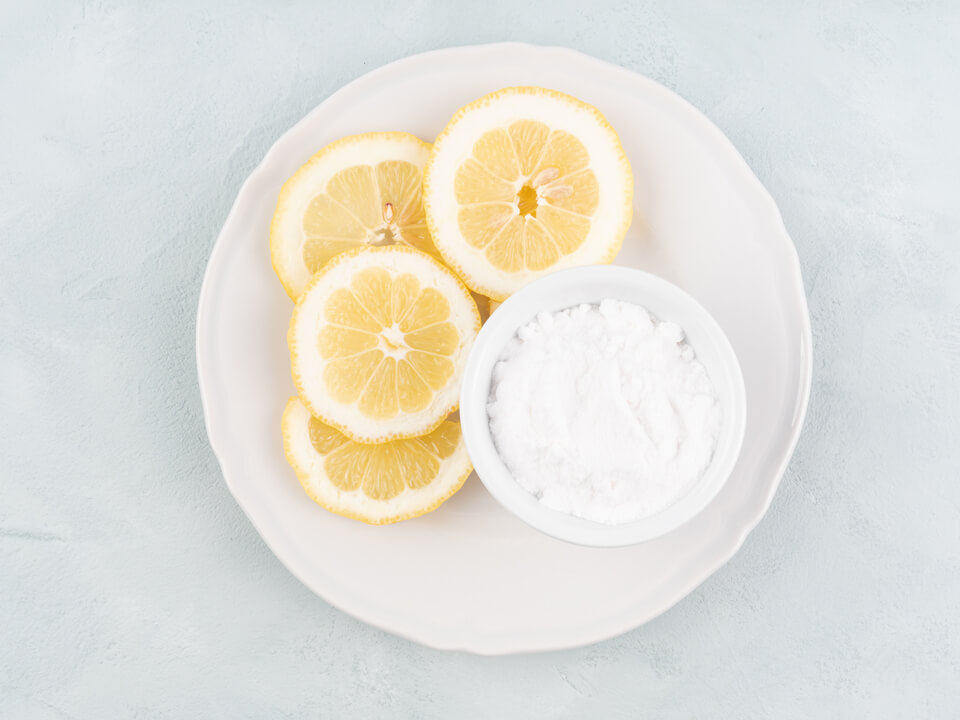
As you can imagine, certain natural ingredients stand out for their remarkable ability to tackle dirt, grime, and bacteria. These natural substances are not only effective but also offer a safer and environmentally friendly alternative to harsh chemical cleaners. By understanding the effectiveness of natural cleaners, you can harness their power to maintain a clean and healthy home.
White Vinegar
White vinegar is a powerhouse among natural cleaners. Its primary component, acetic acid, gives it the ability to clean, disinfect, and deodourize, making it a go-to choice for many who prefer natural cleaning solutions. A study released by the David Suzuki Foundation stated that it can prevent the growth of and even kill some food-borne pathogenic bacteria, and that its bactericidal activity increased with heat!
White vinegar is an effective cleaning product due to its acidic nature. This acidity enables it to cut through grease, dissolve mineral deposits, and break down grime. For instance, vinegar is highly effective in removing soap scum in bathrooms and grease in kitchens. It can also tackle limescale build-up in appliances like kettles and coffee makers, restoring them to good working order.
One of vinegar’s key attributes is its ability to deodourize. It neutralizes odours rather than masking them, making it ideal for removing unpleasant smells from refrigerators, microwaves, and garbage bins. When diluted with water, it can also be used to freshen up laundry, leaving clothes smelling clean without the use of artificial fragrances.
White vinegar is also environmentally friendly. It’s biodegradable and doesn’t contain the harmful toxins and pollutants found in many conventional cleaners. This makes it a safe choice for homes, particularly for families with children or pets.
However, it’s important to note that while vinegar is versatile, it’s not suitable for all surfaces. Its acidic nature means it can damage natural stone surfaces like granite or marble, and it can also harm the finish on waxed furniture and hardwood floors. Always doing a spot test on a small, inconspicuous area before applying it broadly is wise.
Baking Soda
Baking soda, scientifically known as sodium bicarbonate, is highly regarded for its effectiveness as a natural cleaner. A staple in green cleaning practices, this common household item has played a key role in proving the effectiveness of natural cleaners.
The cleaning power of baking soda primarily comes from its mild alkalinity. This quality enables it to effectively neutralize acids and dissolve dirt and grease, making it suitable for a wide range of cleaning tasks. Its mild abrasive texture also contributes to its effectiveness, allowing it to scrub surfaces without causing damage, making it safe for use on a variety of materials, from countertops to sinks and even delicate surfaces like stainless steel and ceramic.
One of the most notable uses of baking soda is as a deodourizer. It has the unique ability to neutralize unpleasant odours at their source, rather than merely masking them. This property makes it ideal for freshening up refrigerators, carpets, and upholstery, and even for use in removing odours from shoes and trash cans. Baking soda is also effective in tackling tough stains. When mixed with water to form a paste, it can be applied to stained surfaces to gently lift and remove the stain. This is particularly useful for cleaning grout, tile, and removing stains from kitchenware. Moreover, when combined with other natural ingredients like vinegar, its cleaning ability is enhanced. The combination creates a fizzing reaction that helps to loosen and lift dirt and residue, making it easier to clean surfaces. This reaction is particularly useful for unclogging drains and cleaning ovens.
Safety is another important aspect of baking soda’s appeal as a natural cleaner. Unlike many commercial cleaning products that contain harsh chemicals, baking soda is non-toxic and safe for use around children and pets. This safety aspect adds to its desirability as an effective natural cleaner.
Lemon Juice
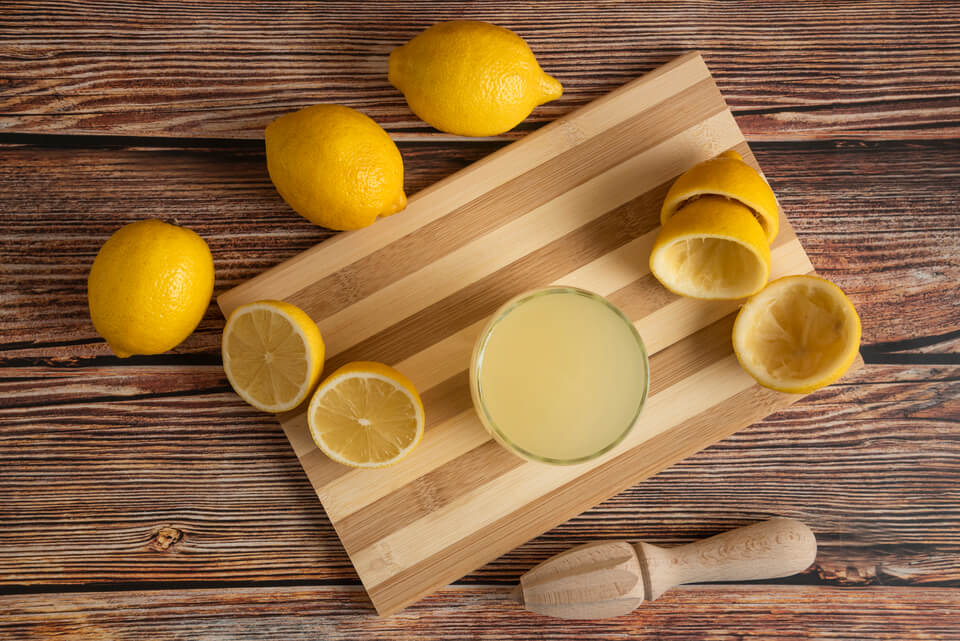
Widely recognized as a natural cleaning agent, the effectiveness of lemon juice is largely due to its antibacterial and antifungal properties. The secret behind its cleaning power lies in its high acidity. Lemon juice has a low pH, making it acidic enough to create an unfriendly environment for many types of bacteria and fungi, which typically thrive in more neutral or alkaline conditions.
The acid in lemon juice is primarily citric acid, which has been shown to be effective in breaking down and removing various substances. It works well against common household bacteria and can inhibit the growth of molds and mildew. For instance, applying lemon juice to surfaces can help to reduce the presence of bacteria like E. coli and Staphylococcus aureus, which are known to cause illness in humans.
Moreover, lemon juice’s natural acidity makes it great for cutting through grease and grime, which is why it’s often used in kitchen cleaning. It can also help in removing stains, particularly those from hard water, due to its ability to break down mineral deposits.
Another advantage of lemon juice is its pleasant, fresh scent, which leaves surfaces smelling clean without the use of artificial fragrances. This makes it a desirable alternative to chemical cleaners that can leave behind a strong, chemical odour.
Tea Tree Oil
Tea tree oil, derived from the leaves of the tea tree plant native to Australia, is a potent natural cleaning agent known for its antibacterial and antifungal properties. The primary component responsible for these properties is terpinen-4-ol, a compound found in high concentrations in tea tree oil.
Tea tree oil has been found to be effective against a wide range of bacteria, including some that are commonly found in households, like E. coli and Staphylococcus aureus. This makes it a valuable tool for cleaning and sanitizing surfaces in kitchens and bathrooms where these bacteria may be present.
In addition to its antibacterial effects, tea tree oil is also a powerful antifungal agent. It can combat various types of fungi, making it useful in preventing and treating mold and mildew in damp areas of the home, like bathrooms and basements. It penetrates the skin of microbes, disrupting their structure and function. This disruption is lethal to bacteria and fungi, helping to eliminate them from surfaces.
Moreover, tea tree oil is also appreciated for its refreshing, clean scent. This makes it a pleasant alternative to chemical-based cleaners that may leave a strong, artificial smell. When used in homemade cleaning solutions, it not only cleans but also deodourizes the area, leaving behind a fresh, natural aroma.
It’s important to note that while tea tree oil is powerful, it should be used in the right concentration to ensure effectiveness and safety. It is often diluted in water or mixed with other natural ingredients like vinegar for cleaning purposes.
Hydrogen Peroxide
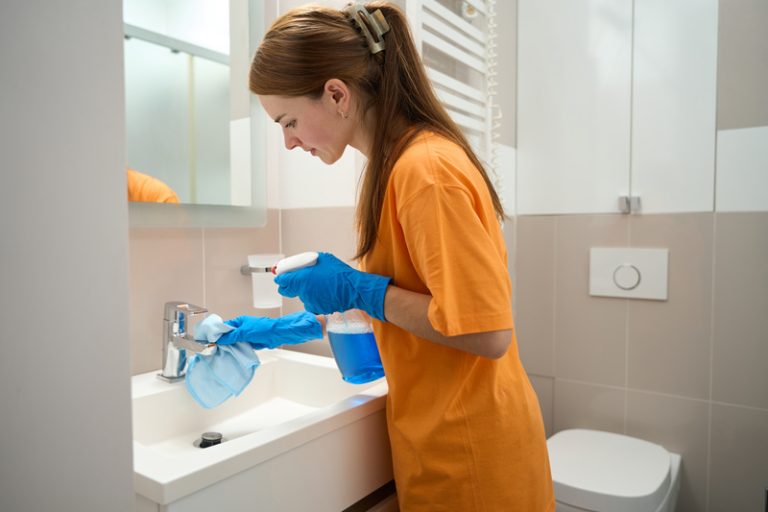
As a natural cleaner, hydrogen peroxide stands out for its versatility and efficacy. Its chemical structure allows it to act as a mild antiseptic and bleaching agent, demonstrating the effectiveness of natural cleaners in kitchens and bathrooms in particular
The effectiveness of hydrogen peroxide as a cleaner can be attributed to how it releases oxygen when it comes into contact with surfaces. This release leads to a fizzing action that helps to break down stains, dirt, and grime, making it easier to wipe them away. This makes hydrogen peroxide particularly effective for removing stains on fabrics and surfaces, as well as for cleaning grout and tiles.
Hydrogen peroxide is also known for its antibacterial properties. It works by destroying the cell walls of bacteria, effectively killing them. This makes it a good choice for disinfecting surfaces, especially in the kitchen and bathroom where bacteria are commonly found. It’s also used to sanitize cutting boards, countertops, and other areas where hygiene is paramount.
Another advantage of hydrogen peroxide is its safety profile compared to stronger chemical cleaners. It breaks down into water and oxygen, making it more environmentally friendly and safer for use around pets and children when used in appropriate concentrations. However, it’s still important to handle it with care, as it can be irritating to the skin and eyes in higher concentrations.
Essential Oils
Essential oils have gained popularity in natural cleaning due to their effectiveness and pleasant scents. Their abilities as cleaning agents is rooted in their natural composition: essential oils are concentrated extracts from plants, containing compounds that have been found to inhibit the growth of bacteria and other microbes. For example, eucalyptus oil contains eucalyptol, a compound known for its germicidal properties. Studies have shown that eucalyptus oil can be effective against common bacteria found in the home, such as E. coli and Staphylococcus aureus.
Lavender oil is another excellent example. Known for its calming scent, lavender oil also exhibits antibacterial activity. It can be used in homemade cleaning solutions to disinfect surfaces while leaving behind a soothing aroma. This dual purpose – cleaning and providing fragrance – is a significant advantage of using essential oils in home cleaning.
Peppermint oil, with its refreshing scent, also has antibacterial properties. It is particularly effective in kitchen cleaners, not just for its ability to clean surfaces but also for its pleasant scent that can help neutralize odours.
When used in homemade cleaning products, essential oils enhance the effectiveness of natural cleaners like vinegar. For instance, a mixture of vinegar and water can be significantly more effective when a few drops of essential oil are added, both in terms of cleaning efficiency and odour management.
Pro Tip: It’s important to note that while essential oils are natural, they are also potent. They should be used in appropriate dilutions to avoid skin irritation or damage to surfaces.
Baking Soda
Baking soda, also known as sodium bicarbonate, is a staple in many households and celebrated for its effectiveness as a natural cleaner. Its mild alkaline nature and gentle abrasive quality make it an incredibly versatile and effective ingredient in a wide range of cleaning tasks.
The effectiveness of baking soda as a natural cleaner can be attributed to several key properties:
Firstly, its mild abrasiveness allows it to scrub and lift dirt and grime without scratching surfaces. This makes it suitable for cleaning everything from kitchen countertops to bathroom tiles, and even delicate surfaces like stainless steel and glass.
Secondly, baking soda is a natural deodourizer. It neutralizes acidic odours and absorbs unpleasant smells instead of just masking them. This property makes it ideal for freshening up refrigerators, carpets, and upholstery, and for use in deodourizing garbage cans and litter boxes.
Moreover, baking soda’s alkaline nature gives it the ability to dissolve dirt and grease in water. This makes it particularly effective for tackling tough kitchen messes, such as greasy pans and stained cooktops. It can also be used as a laundry booster, where its cleaning and deodourizing properties help to lift stains and odours from fabrics.
Baking soda also interacts with acidic components like vinegar to create a chemical reaction that produces carbon dioxide gas. This reaction causes fizzing, which can help to dislodge and lift dirt from surfaces, making it easier to clean areas like clogged drains and dirty grout lines.
In addition to its cleaning prowess, baking soda is safe, non-toxic, and environmentally friendly, aligning well with the principles of using natural cleaners. It is a gentle alternative to harsh chemical cleaners, making it safe for use around children and pets.
Myth 2: Natural Cleaners Are Always Safe and Non-Toxic
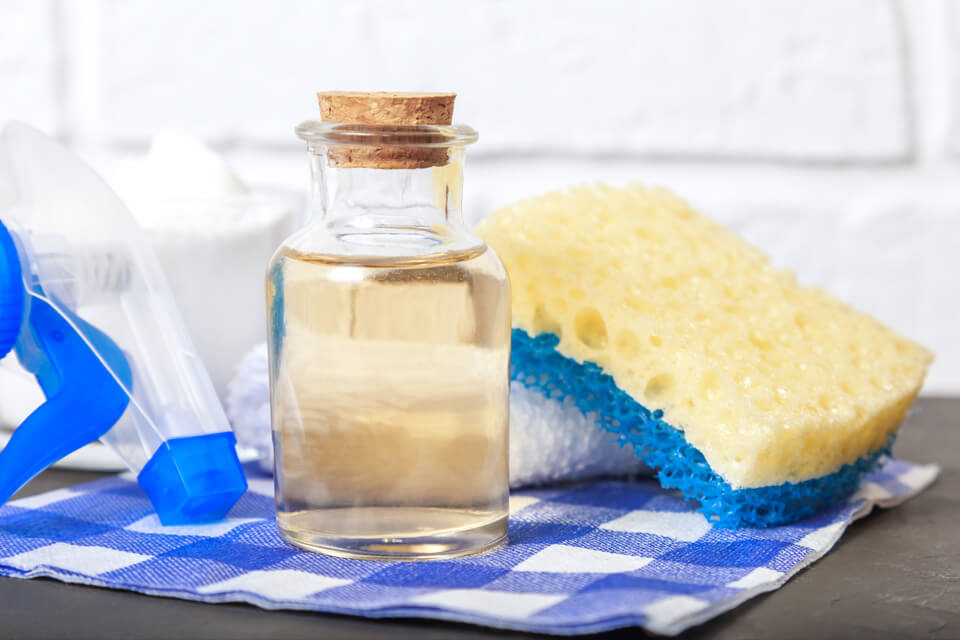
The notion that ALL natural cleaners are inherently safe and non-toxic is a common myth. While the switch to natural cleaning products is often motivated by a desire to avoid the harsh chemicals found in many conventional cleaners, it’s a misconception to assume that all natural ingredients are automatically safe. Understanding the potential risks and practicing safe usage is crucial.
Why the Myth is Misleading
The belief that natural cleaners are absolutely safe overlooks a fundamental principle of toxicology: the dose makes the poison. Even natural substances can be harmful in certain concentrations or under specific conditions. Moreover, natural doesn’t always mean gentle; some natural ingredients can be quite potent. Just as with synthetic chemicals, natural ingredients can cause allergic reactions, skin irritation, or other health issues if not used correctly. This misperception can lead to careless handling and overexposure, potentially resulting in adverse effects. For example, Borax (which is often used in DIY cleaning products) can be harmful if ingested and irritate the skin. It should be used with caution, especially in homes with small children or pets.
Guidelines for Safe Use of Natural Cleaning Products
To harness the effectiveness of natural cleaners safely, consider the following guidelines:
- Read and Follow Instructions: Even with natural products, it’s important to read and follow usage instructions. Pay attention to recommended dilutions and application methods.
- Patch Test Surfaces: Before using a natural cleaner on a new surface, do a patch test in an inconspicuous area to ensure it doesn’t cause damage.
- Wear Protective Gear: When using acidic or abrasive natural cleaners, wear gloves to protect your skin. In some cases, wearing a mask or ensuring adequate ventilation may be advisable.
- Store Safely: Keep natural cleaning products out of reach of children and pets. Although they are natural, they can be harmful if ingested or if they come into contact with eyes.
- Be Mindful of Allergies: If you or someone in your household has allergies, be cautious with ingredients known to cause reactions, especially certain essential oils.
- Avoid Mixing Certain Ingredients: Some natural ingredients can react with each other. For example, mixing vinegar with hydrogen peroxide creates peracetic acid, which can be harmful.
- Use in Proper Concentrations: Ensure that natural ingredients are used in safe concentrations. Overuse can lead to surface damage or health risks.
- Dispose of Responsibly: Properly dispose of any rags or materials used for cleaning with natural products, as they can retain residues that might be harmful.
By understanding the properties of natural ingredients and following safety guidelines, you can enjoy the benefits of these cleaners without compromising on health and safety. This approach ensures that the effectiveness of natural cleaners is matched by a commitment to safe and responsible use.
Myth 3: Natural Cleaners Are More Expensive

A common misconception surrounding natural cleaners is that they are a lot more expensive than their conventional counterparts. This myth persists despite evidence showing that natural cleaning solutions can be both cost-effective and efficient.
Perception of Cost in Natural Cleaners
The belief that natural cleaners are pricier often stems from the initial cost of commercially available natural cleaning products. These products can sometimes be more expensive on the shelf compared to standard cleaning solutions. However, this view doesn’t account for the affordability and effectiveness of natural cleaners, nor does it consider the long-term savings associated with using natural ingredients.
Cost Comparison: Natural vs. Conventional Cleaning Products
When comparing the costs of natural and conventional cleaning products, it’s important to consider both short-term and long-term expenses. Commercial natural cleaning products might have a higher price tag upfront, but they often last longer due to their concentrated formulas. Additionally, many natural ingredients used in DIY cleaners, like vinegar, baking soda, and lemon juice, are inexpensive and available in bulk.
Conventional cleaners, while sometimes cheaper at purchase, may lead to hidden costs. For instance, the potential health impacts of prolonged exposure to harsh chemicals found in these products can lead to increased medical expenses. Furthermore, the environmental toll of conventional cleaners can contribute to long-term societal costs, such as water treatment and pollution control.
Tips for Cost-Effective Natural Cleaning Solutions
- DIY Recipes: Making your cleaners is a cost-effective way to use natural ingredients. Simple recipes using vinegar, baking soda, and essential oils can create effective cleaning solutions for a fraction of the price of commercial products.
- Bulk Buying: Purchasing ingredients like vinegar, baking soda, and castile soap in bulk can reduce costs significantly. These ingredients have a long shelf life and can be used in various cleaning tasks.
- Reusing and Recycling: Using reusable cleaning cloths instead of disposable ones not only benefits the environment but also saves money. Old t-shirts and towels can be repurposed as cleaning rags.
- Proper Dilution and Use: Following correct dilution ratios and usage guidelines ensures that natural cleaners are used efficiently, preventing waste and maximizing effectiveness.
Long-term Economic Benefits of Using Natural Cleaners
The long-term economic benefits of using natural cleaners extend beyond immediate cost savings. These include:
- Health Cost Savings: Using natural cleaners reduces exposure to harmful chemicals, potentially lowering health risks and associated medical costs.
- Environmental Impact: Natural cleaners minimize environmental damage, which can have economic implications, such as lower waste management costs and less environmental remediation.
- Durability of Surfaces: Many natural cleaners are gentler on surfaces, prolonging the life of items like clothing, countertops, and floors, and reducing the need for frequent repairs or replacements.
- Energy Efficiency: Some natural cleaning practices, like using cold water with natural laundry detergents, can save energy and reduce utility bills.
While some commercial natural cleaning products may be more costly upfront, the overall economic advantages of natural cleaners become apparent when considering DIY options, bulk purchases, and the long-term financial benefits. The effectiveness of natural cleaners, coupled with their economic and health advantages, makes them a smart choice for cost-conscious and environmentally aware consumers.
Myth 4: Natural Cleaners Don’t Kill Germs and Bacteria
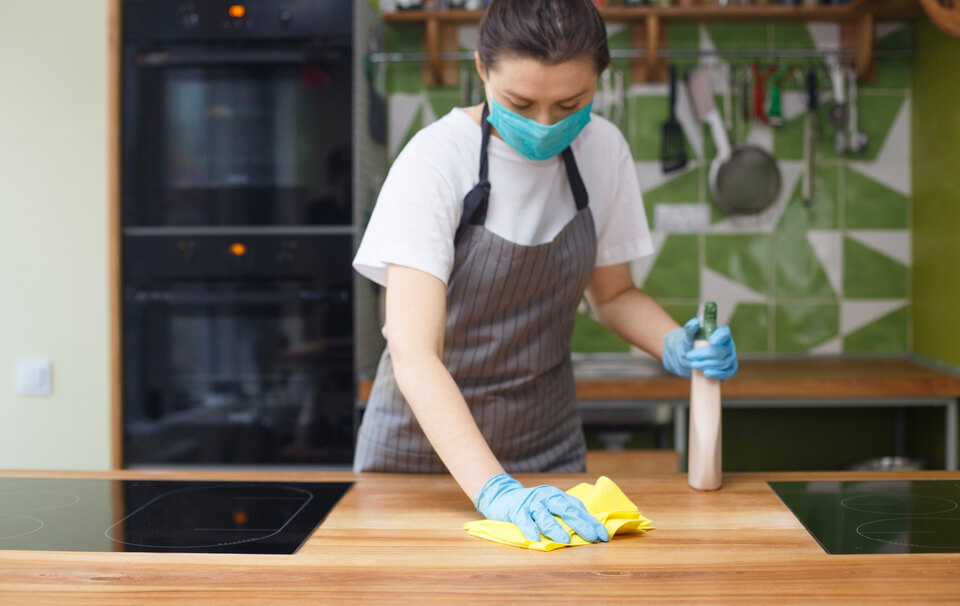
A prevalent misconception about natural cleaners is that they lack the germ-killing ability of their chemical counterparts. This myth often leads to skepticism regarding the effectiveness of natural cleaners in disinfecting and sanitizing surfaces. However, research and practical usage suggest that many natural ingredients do possess significant antimicrobial properties, challenging the notion that they are ineffective against germs and bacteria.
Understanding the Misconception
Many people doubt the germ-killing abilities of natural cleaners because of their perceived mildness compared with chemical disinfectants. While it’s true that some natural cleaners may not be as potent as certain industrial-strength disinfectants, many are effective enough for regular household cleaning and sanitization.
Antimicrobial Properties of Natural Ingredients
Several natural ingredients have been recognized for their antimicrobial properties. For example:
- Acetic acid in vinegar is known for its antibacterial activity. It has been shown to be effective against common bacteria such as E. coli and Staphylococcus aureus. While not as potent as commercial disinfectants, vinegar is a good option for everyday cleaning.
- Hydrogen peroxide is a natural disinfectant with effectiveness against a wide range of microorganisms. It’s particularly useful for disinfecting surfaces in the kitchen and bathroom.
- Tea tree oil has been found to have strong antibacterial and antifungal properties. It is effective against several common household bacteria and can be used in DIY cleaning recipes.
- The citric acid in lemon juice has natural antibacterial properties, making it useful for cleaning and sanitizing surfaces. Its effectiveness, combined with its pleasant scent, makes it a popular choice for natural cleaning.
Comparison with Chemical Disinfectants
While chemical disinfectants, such as bleach, are known for their strong antimicrobial activity, they come with drawbacks, including potential health risks and environmental impact. Natural cleaners, on the other hand, offer a safer alternative, particularly for homes with children, pets, or individuals with sensitivities to harsh chemicals.
It’s important to note that while natural cleaners are effective against many types of bacteria and some viruses, they may not eliminate all pathogens. For example, during an outbreak of a serious illness, stronger disinfectants may be recommended by health authorities.
Practical Advice on Using Natural Cleaners for Sanitization
- Know When to Use Them: Natural cleaners are great for everyday cleaning and can disinfect surfaces in most cases. However, for high-risk areas or during illness outbreaks, stronger disinfectants may be necessary.
- Proper Preparation and Usage: For natural ingredients to be effective, they should be used correctly. For example, vinegar should be used undiluted for maximum effectiveness, and hydrogen peroxide should be left on surfaces for a few minutes before wiping.
- Regular Cleaning: Regular cleaning with natural cleaners can reduce the overall bacterial load, making environments safer.
- Combine with Good Hygiene Practices: Alongside using natural cleaners, maintaining good hygiene practices like regular hand washing and avoiding cross-contamination in kitchens is crucial.
- DIY Recipes: You can create effective disinfectant solutions by combining natural ingredients. For instance, a mixture of vinegar and water can be used for cleaning surfaces, and adding a few drops of tea tree oil can enhance its antibacterial properties.
- Safety Precautions: Even natural ingredients can be potent. Always ensure good ventilation, wear gloves if necessary, and be cautious to avoid direct contact with skin and eyes.
While natural cleaners might not always match the strength of heavy-duty chemical disinfectants, they do possess antimicrobial properties that make them effective for regular household cleaning and sanitization. The effectiveness of natural cleaners, along with their environmental and health benefits, makes them a practical choice for those looking to reduce their reliance on harsh chemicals while still effectively combating germs and bacteria.
Myth 5: Natural Cleaning Products Don’t Work on Tough Stains and Grime

The belief that natural cleaning products are ineffective against tough stains and grime often leads people to choose harsh chemical cleaners for challenging jobs. However, this view overlooks the proven effectiveness of natural cleaners in tackling even the most stubborn stains.
Challenging the Belief
The misconception that natural cleaners are inadequate for tough stains likely stems from the aggressive marketing of chemical cleaners, which are often presented as the only solution for difficult cleaning tasks. However, many natural ingredients possess powerful cleaning properties that can effectively address tough stains and grime. It’s about understanding which ingredients to use and how to use them effectively.
Tips for Enhancing Stain Removal Power of Natural Cleaners
Pre-Treat Stains: For tough stains on fabrics, pre-treating with a solution of vinegar or a paste of baking soda and water can be effective. Apply the mixture directly to the stain, let it sit for a while, and then wash as usual.
- Hot Water Boost: Using hot water can enhance the effectiveness of natural cleaners, especially for greasy stains. The heat helps to break down oils, making them easier to remove.
- Longer Soak Times: Allowing the natural cleaner to sit on the stain for an extended period can improve its effectiveness. This is particularly useful for set-in stains or grime.
- Scrubbing with Abrasives: For tough surface stains, using a natural abrasive like baking soda can help. The gentle abrasive action of baking soda can lift stains without damaging surfaces.
- Combining Ingredients: Sometimes, combining natural ingredients can create a more powerful cleaner. For example, mixing vinegar with baking soda creates a fizzing action that can help lift stubborn stains.
Natural Products and Ingredients for Tough Jobs
- Vinegar: Vinegar’s acidity makes it excellent for breaking down mineral deposits, soap scum, and various types of organic stains. It can be used in a diluted form for general cleaning or undiluted for more stubborn stains.
- Baking Soda: Baking soda is a versatile cleaner effective against a wide range of stains, from grease to mildew. It’s particularly good for scrubbing surfaces without causing damage.
- Lemon Juice: The citric acid in lemon juice is effective against tough stains, especially those caused by hard water. It’s also great for removing rust stains and brightening whites.
- Hydrogen Peroxide: Hydrogen peroxide acts as a mild bleach, making it effective for treating stains on white fabrics and surfaces. It’s particularly good at removing stains from grout and tiles.
- Castile Soap: This plant-based soap is effective against dirt and grease. It can be used for a variety of cleaning tasks, from dishwashing to laundry.
- Essential Oils: While primarily used for their scent, some essential oils like tea tree, eucalyptus, and orange oil have grease-cutting and antibacterial properties, making them useful additions to DIY cleaning solutions.
Using Natural Cleaners Effectively
- Understand the Stain: Different stains require different treatments. Knowing the nature of the stain (grease, rust, organic, etc.) can help in choosing the right natural cleaner.
- Be Patient: Natural cleaners often require more time to work compared to chemical ones. Patience is key, especially for set-in stains.
- Test Surfaces First: Before using any cleaner, natural or otherwise, on a large area, it’s wise to test it on a small, inconspicuous area first.
- Use the Right Tools: Pairing natural cleaners with the right cleaning tools (brushes, cloths, sponges) can enhance their effectiveness.
- Consistency is Key: Regular cleaning with natural products can prevent stains from becoming too set-in, making them easier to tackle over time.
The effectiveness of natural cleaners against tough stains and grime is often underestimated. With the right approach and a bit of know-how, natural cleaners can effectively tackle a wide range of tough cleaning tasks. Not only do they offer a safer and more environmentally friendly alternative to chemical cleaners, but they also prove that you don’t need harsh chemicals to deal with difficult stains. By understanding and applying the power of natural ingredients, you can keep your home clean and stain-free in an eco-friendly and health-conscious way.
Sustainability and Environmental Impact of Natural Cleaning Products

The shift towards natural cleaning products is not only a matter of personal health and safety but also a big step towards environmental sustainability. The use of natural cleaners has a positive impact on ecological conservation, making them a responsible choice for consumers concerned about their environmental footprint.
Ecological Benefits of Using Natural Cleaners
Natural cleaners, which are often made from biodegradable, plant-based ingredients, present a minimal threat to the environment. Unlike their chemical counterparts, these cleaners break down easily and harmlessly, reducing pollution in waterways and soil. The biodegradable nature of these substances means they don’t contribute to the buildup of harmful chemicals in ecosystems, which can have detrimental effects on wildlife and plant life.
The manufacturing process of natural cleaners also tends to have a lower environmental impact. These products generally require less energy and fewer raw materials to produce, and they often come in recyclable or reusable packaging. The reduced energy consumption and waste production contribute to the overall sustainability of these products.
Impact of Chemical Cleaners on the Environment
In contrast, chemical cleaners often contain substances like phosphates, nitrates, ammonia, and synthetic fragrances, which can cause significant environmental harm. When these chemicals are washed down drains, they eventually end up in waterways, contributing to water pollution and the eutrophication of aquatic ecosystems. This can lead to algal blooms that deplete oxygen in the water, harming aquatic life.
The production of chemical cleaners also has a substantial environmental footprint. The extraction and processing of raw materials used in these products often require high energy consumption and result in the emission of greenhouse gases. Furthermore, the packaging of chemical cleaners, which is often not biodegradable or recyclable, contributes to landfill waste and the depletion of natural resources.
Role of Natural Cleaners in Promoting Sustainable Living
By choosing natural cleaners, consumers can reduce their ecological footprint, contributing to the conservation of natural resources and the protection of ecosystems. The use of natural cleaners also supports a more sustainable lifestyle by encouraging practices that are in harmony with nature.
Moreover, the effectiveness of natural cleaners in dealing with everyday cleaning tasks proves that it is possible to maintain cleanliness and hygiene without compromising the health of the planet. This realization can lead to a broader shift in consumer behavior, where more people opt for environmentally friendly products in other aspects of their lives.
Encouraging Responsible Consumer Behavior
- Educate on the Benefits: Raising awareness about the environmental benefits of natural cleaners is key. Consumers should be informed about how their choices impact the planet and how switching to natural products can make a difference.
- Promote the Use of DIY Cleaners: Encouraging the use of homemade cleaning solutions can reduce reliance on commercially produced products, further minimizing environmental impact. DIY recipes often utilize common household items like vinegar, baking soda, and lemon juice, which are safe, effective, and eco-friendly.
- Support Sustainable Brands: When purchasing natural cleaning products, consumers should look for brands that practice sustainability in their production and packaging. Supporting these brands helps promote the market for eco-friendly products.
The ecological benefits of using natural products, coupled with the harmful impact of chemical cleaners on the environment, highlight the need for a shift in consumer behavior. By choosing natural cleaners, you can play a part in protecting the planet, conserving natural resources, and promoting a healthier ecosystem.
The effectiveness of natural cleaners demonstrates that environmental responsibility does not have to come at the cost of cleanliness and hygiene. As consumers become more aware and make more environmentally conscious choices, we move closer to a sustainable and ecologically balanced way of living.
The Benefits of Hiring a Green Cleaning Company to Clean Your Home

More people are using green cleaning companies for home cleaning services. This shift not only supports a healthier living environment but also contributes to broader environmental conservation efforts. Let’s take a closer look at the different advantages!
Healthier Home Environment
One of the primary benefits of using a green cleaning service is the creation of a healthier living environment. Traditional cleaning products often contain harsh chemicals that can leave behind residues and fumes, potentially causing health issues such as respiratory problems, skin irritations, and allergic reactions. Green cleaning companies use natural cleaners that are free from these harmful chemicals, ensuring the air quality in your home remains safe and clean.
The effectiveness of natural cleaners in removing dirt, grime, and bacteria, without the use of toxic substances, means that your home is not only clean but also free from potentially harmful chemical exposure. This is particularly beneficial for households with children, pets, or individuals with allergies or sensitivities to harsh cleaning agents.
Environmental Impact
Green cleaning companies contribute to environmental conservation. By using eco-friendly and biodegradable cleaning products, these services reduce the amount of toxic chemicals released into the environment. Unlike conventional cleaning agents that can harm waterways, wildlife, and plant life when washed down drains, natural cleaners break down easily and have a minimal ecological footprint.
Efficacy and Quality of Cleaning
Despite some misconceptions, the effectiveness of natural cleaners used by green cleaning services is comparable to, and sometimes exceeds, that of traditional cleaning products. Innovations in green cleaning technology have led to the development of natural products that effectively tackle tough stains, dirt, and germs, ensuring a thorough and high-quality clean.
Green cleaning companies are typically well-versed in the best practices for using natural cleaners, ensuring they are used effectively to achieve optimal results. This expertise means that customers do not have to sacrifice cleanliness for sustainability.
Supporting Sustainable Practices
Choosing a green cleaning company reflects a commitment to sustainable and responsible consumer behavior. By opting for these services, you are supporting businesses that prioritize the environment and health. This choice not only contributes to the demand for eco-friendly products but also encourages the development and innovation of green cleaning technologies and practices.
Cost-Effectiveness
While there may be a perception that green cleaning services are more expensive, they can actually be quite cost-effective. The long-term health benefits of using natural cleaners can lead to reduced medical expenses related to chemical exposure. Additionally, green cleaning companies often employ efficient cleaning methods that save time and resources, potentially reducing the overall cost of their services.
Customized Cleaning Approaches
Many green cleaning companies offer customized cleaning plans tailored to the specific needs and preferences of their clients. This personalized approach ensures that the cleaning services provided are exactly what the customer requires, whether it’s focusing on certain areas of the home, using specific natural products, or following certain cleaning schedules.
Improved Indoor Air Quality
Conventional cleaning products can contribute to indoor air pollution. Green cleaning services, by using natural and non-toxic cleaners, help improve the indoor air quality of your home. This is particularly important for individuals suffering from asthma or other respiratory issues, as it reduces their exposure to irritants and pollutants.
Peace of Mind
Knowing that your home is being cleaned with eco-friendly products provides peace of mind. There’s a sense of comfort and reassurance in knowing that the products used in your home are safe for your family and pets, and not damaging to the environment.
Promoting a Greener Lifestyle
By hiring a green cleaning company, you are taking an active step towards living a greener, more sustainable lifestyle. This decision can inspire further eco-friendly choices in other areas of life, contributing to a more environmentally conscious way of living. From ensuring a healthier living environment to contributing to environmental conservation, the advantages extend beyond mere cleanliness. The effectiveness of natural cleaners, combined with the expertise of green cleaning services, ensures that your home is not only clean but also a safer, more sustainable space. This choice supports eco-friendly businesses, promotes sustainable living practices, and provides peace of mind, all while maintaining the high standards of cleanliness you desire for your home.
Questions About the Effectiveness of Natural Cleaners?
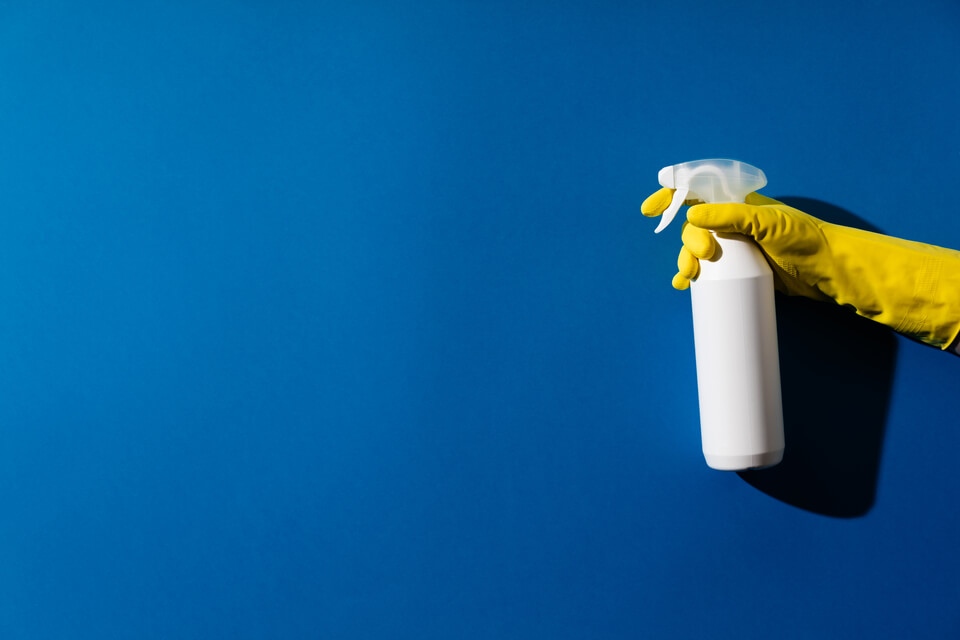
The choice of cleaning products we use in our homes has implications not only for our health and well-being but also for the environment. The discussion above highlights the numerous benefits of opting for natural cleaning solutions – from their effectiveness in tackling dirt and stains to their role in promoting a healthier home and a more sustainable living environment.
Making informed choices about the cleaning products we use is more important than ever. With the growing awareness of the impact of these products on our health and the planet, it’s important to consider alternatives. Natural cleaning solutions offer a viable and effective option, allowing us to maintain cleanliness in our homes without the drawbacks of harsh chemicals.
As we go about our daily lives, the decision to switch to natural cleaners is a positive step towards a healthier, safer, and more environmentally responsible lifestyle. For those interested in exploring the benefits of green cleaning, consider reaching out to professional services that specialize in eco-friendly practices.
At Three Little Birds, our commitment to using natural cleaning products ensures that your home is not only spotlessly clean but also a safe and healthy environment for you and your family. If you’re ready to make the switch and contribute to a greener future, give us a call at 905-538-5046. By choosing our services, you’re taking a significant step towards a cleaner, greener, and healthier home.
